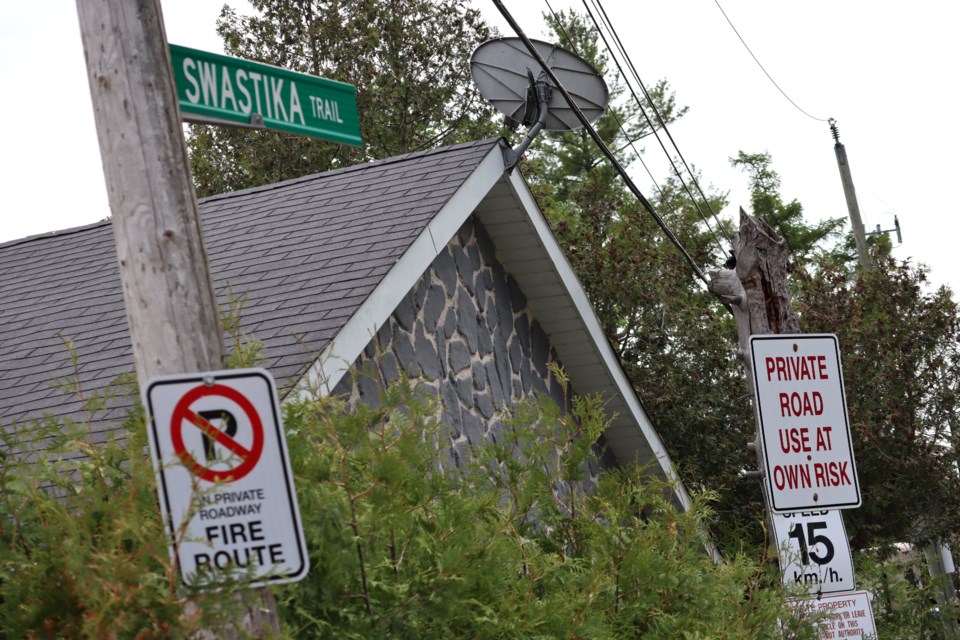A recent closed-door meeting of Puslinch township councillors over continued efforts to rename Swastika Trail, appears to have been organized in response to a requested audience with Holocaust survivors and representatives of a Jewish global human rights organization.
During the May 26 council meeting, Puslinch councillors went in-camera to hear information about Swastika Trail provided by the township’s solicitor.
At the time, it was unclear why a closed door meeting was necessary, but now it appears to have been in regards to an email sent from the man leading the push to rename the private Puslinch road.
Earlier this year, Randy Guzar successfully petitioned the House of Commons on the issue, gathering close to 1,800 electronic signatures that call for the federal government to condemn use of the “swastika” as a sign, symbol, or name in public areas.
His May 3 invitation to Puslinch council asked if they would grant a meeting with residents and representatives from the Friends of Simon Wiesenthal Centre (FSWC) for Holocaust Studies.
“It is our hope that through dialogue, Council will better understand the concerns of our community,” he wrote.
In an emailed response to Guzar’s request, the day after the closed-door meeting, however, Puslinch clerk Courtenay Hoytfox, reiterated the township’s stance that they consider the matter closed.
“The matter of renaming the road has been addressed at length by both Council for the Township and by the Divisional Court, which upheld Council’s decision not to initiate a process to rename the private road,” she wrote.
A request by CambridgeToday for comment about why the matter had to be discussed in-camera went unanswered.
Despite the township's refusal, Guzar said the fight is far from over.
“My neighbours and I were both shocked and disappointed that Council refused to meet with us and our guests, the Friends of Simon Wiesenthal Centre, including a Holocaust survivor,” he wrote in an email to CambridgeToday. “It was our hope that through an open discussion, Council would understand the very real hurt associated with the street name.
“How can they justify a closed-door meeting to deny a Holocaust survivor the opportunity to offer their valuable perspective?”
Jaime Kirzner-Roberts, director of policy with FSWC, echoed Guzar in expressing disappointment with the township's decision.
She had hoped hearing from "people who endured unspeakable suffering and saw their loved ones taken from them because of the hate symbolized by the swastika" might have led council to reconsider its stance.
Kirzner-Roberts went on to debunk an argument made by residents who want to keep the name; that the street name has nothing to do with Nazis or Hitler.
"Swastika Trail was named in the 1920s when the swastika had already been adopted by the Nazi party as a symbol of hatred," she wrote.
Asked if there are other avenues residents can take now that the current roster of council members appears to have washed its hands of the matter, Guzar lashed out at the township’s reluctance to simply rename the street.
“The Superior Court’s ruling was clear – the Township has the legal right to rename the street,” Guzar wrote. “Council knows what the Swastika symbolizes for my neighbour, whose father was murdered in the Holocaust. They know what it means to me as someone whose father fought the odious Nazi regime. Council has the ability to make a difference – they’re choosing not to.”
This week, the City of Toronto recommended the process to rename Dundas Street should move ahead after the city received a complaint last year about its namesake Henry Dundas’ ties to the slave trade.
Guzar sees parallels in his group’s efforts and wonders what it will take to get Puslinch to do the same.
“Canadians are reflecting on the meanings of symbols and statues – and considering their impacts on others. Across the country we’ve seen universities, cities, and other institutions think carefully about what it means when we honour an individual with street and building names or statues,” he wrote.
“The public reaction has been clear, the names we use matter. We want to create a more welcoming and inclusive society for all Canadians – and our national symbols and nomenclature must match.”
Kirzner-Roberts, however, said "there is nothing new or faddish about the rejection of the swastika and the hatred and genocide that it represents."
"Canada fought a world war to defeat the Nazis in which 45,000 Canadians soldiers gave their lives. For decades we have been asking the Township to change the name of Swastika Trail as a basic matter of respect for our veterans, for survivors of the Holocaust, and for all those who suffered the horrors of the Nazi regime."



